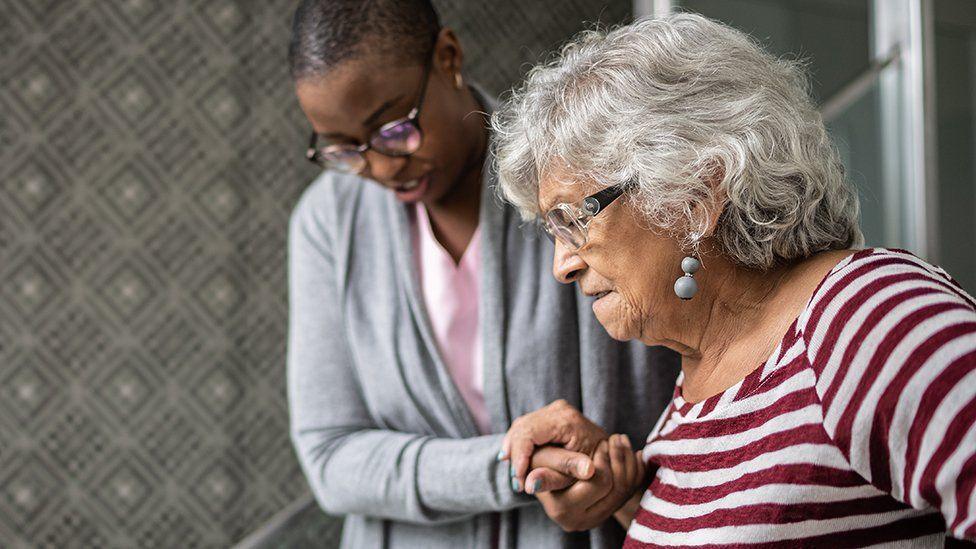Community health faces unprecedented pressures - watchdog

- Published
Community health and social care faces "unprecedented pressures" amid funding shortfalls and rising demand for services, according to Scotland’s public spending watchdog.
A report by the Accounts Commission said services such as mental health support, drug and alcohol programmes and older people's support face further cuts in provision.
The services are run by Integration Joint Boards (IJBs) that work between local government and health boards to plan many community based health and social care services.
The Accounts Commission said financial pressures from inflation, demographic changes and the Covid-19 pandemic, are making it difficult to "sustain services at their current level".
It warned the projected funding gap for IJBs in 2023-24 had "almost tripled" in a year and now stands at £357m.
National Care Service delayed by three years
- Published14 December 2023
Special cabinet to discuss £1bn budget black hole
- Published6 December 2023
Last December, former health secretary Michael Matheson confirmed the government has delayed its flagship plan to set up a National Care Service by three years to 2028-29.
In response to the Accounts Commission report the Scottish government said it had invested record funds in health and social care.
It also said IJB budgets for the 31 partnerships across the country are for local authorities and health boards to agree.
Angela Leitch, of the Accounts Commission, said the pressures facing social care and community healthcare were complex and warned health inequalities were widening.
She added: "These issues can’t easily be resolved, and the situation is getting worse.
"Integration Joint Boards can’t tackle these challenges alone - they need the support of councils, health boards, Scottish government and other partners to help them make the urgent changes that are needed now.
"Without this collaborative approach to change, the pressures facing Integration Joint Boards will get worse."

Integration Joint Boards should streamline access to health and social care support, but like everywhere else, things are tight and services are being scaled back.
In part, because the cost of delivering services has increased beyond the additional funds they receive, but also because demand is rising sharply.
Three quarters of those who need social care or more frequent access to community healthcare are aged over 65.
That’s 20% of the population and the proportion is set to grow by a third in the next twenty years.
It's a really challenging landscape where already high vacancy rates are exacerbated by recruitment freezes or cuts to provision to make financial savings, yet all the while more people need help.
With things so stretched the focus has been on crisis management and not preventative action.
That may mean fewer visits from a carer or a longer wait for mental health counselling, but these are the sort of services that keep people out of expensive hospitals and go against decades of government policies that stress the importance of caring for people as close to home as possible.

The report found many services are having to make "unsustainable savings" by not filling staff vacancies.
It also highlighted the "unsustainable" reliance on the country's estimated 800,000 unpaid carers as social care staff come under increased pressure.
The Royal College of Nursing (RCN) described the report as "damning".
RCN Scotland director Colin Poolman said: "Too often the focus is on the crisis in acute hospitals, but hospital overcrowding is a symptom of the lack of investment and prioritisation of community services. The whole system is at breaking point."
Labour social care spokesperson Jackie Baillie said community health in Scotland was under extreme pressure.
She added: "If the SNP government does not address the mounting pressure on IJBs, it will have devastating consequences for people who rely on these services and for our entire healthcare system."
And Scottish Conservative deputy health spokeswoman Tess White warned budget cuts were having a massive impact.
She added: "This damning report exposes the scale of the crisis in Scotland's social care system which the SNP are presiding over."
A Scottish government spokesman said a "record" £19.5bn had been invested in health and social care in 2024-25.
It includes an allocation of more than £2bn for social care and integration in a bid to deliver on a commitment to increase spending in this area by 25%.
He added: "Our funding supports the work delivered by Integration Joint Boards, but budgets and overall funding allocations are agreed by local authorities and health boards, not the Scottish government.
"We understand the recruitment challenges within health and social care and offer funding to advertise vacancies.
"We remain committed to supporting the delivery of improved, sustainable health and social services across Scotland."